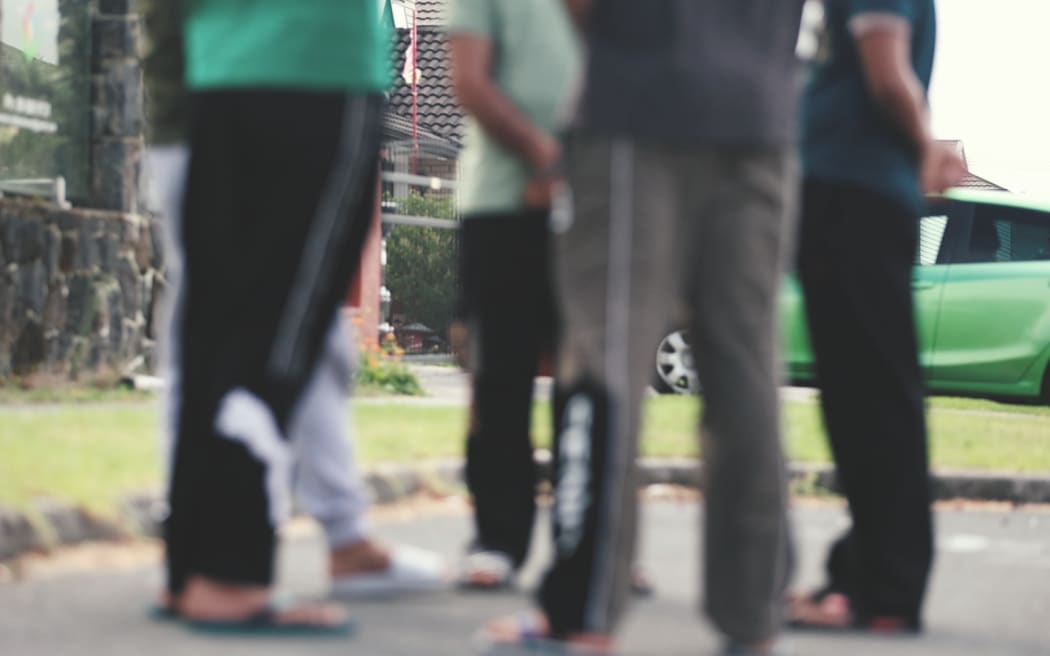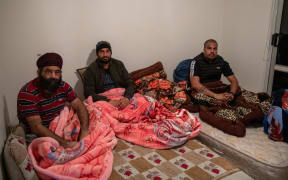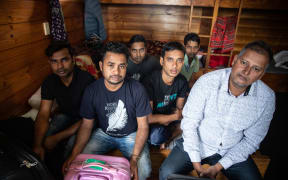Five workers on accredited employer work visas from Punjab, India, have found themselves in limbo upon arriving in New Zealand to work at a restaurant in Auckland.
The workers claim the restaurant owner has demanded extortion payments, imposed extended work hours and withheld wages since the end of December.
The owner of the restaurant denies the accusations.
The workers stopped turning up for work on 20 February and have since been taking refuge at a Sikh temple in Auckland.
This latest case of alleged exploitation comes shortly after the release of an independent review into the accredited employer work visa (AEWV) scheme by the Public Service Commission, led by Jenn Bestwick.
The AEWV process has attracted intense media scrutiny since reports emerged in early 2023 that migrant workers on such visas were finding themselves destitute and jobless after paying large sums of money to relocate to New Zealand.
The Public Service Commission review found that Immigration New Zealand (INZ) did not adequately assess the risk and impact of changes to speed up processing times would have on visa abuse.

Photo: 123RF
Ministry of Business, Innovation and Employment (MBIE) chief executive Carolyn Tremain acknowledged the seriousness of the issues raised in the review.
"Since 30 June last year, Immigration New Zealand has made a number of changes to tighten the settings, introducing more checks and, as a consequence, processing times have increased," Tremain said.
However, the workers that RNZ spoke to started arriving in September 2023, with the latest landing in Auckland in January.
The case reflects the enormous challenges immigration authorities face in tightening the settings to prevent persistent exploitation in the hospitality and construction sectors, among others.
Exploitation allegations
RNZ has chosen not to disclose the name of the restaurant and its owner because the matter is currently under a potential investigation by INZ.
Jagmeet Singh, 19, arrived in September and began working at the restaurant
"The owner stopped paying us since December and, when we enquired, he threatened us with visa cancellation," he said.
"A friend gave me a reference. I got in touch with the owner, and he gave me an AEWV visa."
The workers claimed to have paid the restaurant owner significant sums to bank accounts registered in his name in India and New Zealand for visas and job placements.
Bank statements seen by RNZ showed sums totalling $30,000 deposited into these accounts, with a further $20,000 to $25,000 allegedly paid in cash.
Jasjeevan Singh, 22, arrived in October, alleging that he was only paid for the first few weeks.
"The last pay that I got was in January," he said. "After that he [has] only paid me $300."

Photo: RNZ / Blessen Tom
The workers claim the owner made them work about 40 to 50 hours on average each week.
Tejbir Singh, 25, said he encountered a similar experience.
"Most of us have definitely worked more than 40-plus hours a week and never got paid even for the 30 hours," he said.
"We were working from 11am to 12am with a three-hour break," Tejbir said.
Tejbir arrived in December and began working at the restaurant in January, reportedly receiving $600 for five weeks of work.
Manjot Singh, 23, reportedly paid approximately $50,000 to the restaurant owner's brother's account in India before coming to New Zealand.
"I have statements of those transactions just like the others," he said.
Harkirat Singh Sekhon, 32, a former chef in India, arrived in New Zealand in January but was told he couldn't work because he hadn't paid the processing fee in full.
"In India, he demanded 2.5 million rupees (about $50,000), of which I transferred 238,000 rupees ($4700) in the owner's account in India and 500,000 rupees (about $9,800) in his associate's account in India," Sekhon said.
After this initial payment, Sekhon received his visa and arrived in New Zealand.
However, the owner allegedly asked Sekhon to pay the remainder of the money, about $30,000, if he wanted to work at the restaurant.
"It was hard for me to gather that much money, and my friends in NZ said it was too much and not a normal processing fee," he said.
Sekhon claimed the owner kept threatening him for the remaining payment, even going so far as to threaten his family in India.
"He told me that he would send goons to my family back in India if I didn't pay him soon."
In mid-February, the workers contacted the police.
Police confirmed a complaint had been made, saying that they had made "initial enquiries into the incident and the matter has since been referred to MBIE."

Photo: RNZ / Blessen Tom
The group now survives with the help of the Sikh gurdwara in South Auckland.
"MBIE Immigration Investigation can confirm that a complaint has been received regarding the situation you have referred to," MBIE Immigration Investigation national manager Jason Perry said.
"If appropriate, it will be allocated to a team for review and potential investigation," he said.
INZ deputy chief operating officer Jeannie Melville said AEWV holders must be given a minimum of 30 hours work per week.
"A worker compelled to work excessive hours without a break is an example of migrant exploitation," Melville said.
She said INZ conducted post-accreditation checks on accredited employers, aiming to check about 16 percent of them each year.
"It is a combination of random selection, as well as targeted checks on a sample of all accredited employer types in addition to checks on all franchisee and controlling third-party business models and any businesses that have been referred to us through a complaint or issue raised," she said.
As of 16 February, INZ had approved 108,938 AEWV applications through 32,797 accredited employers. It conducted 2712 post-accreditation checks, with 596 more ongoing.
Meanwhile, MBIE has received 2107 complaints against accredited employers, leading to 174 active investigations. One hundred and forty-five employers have had their accreditation revoked, while 53 have been suspended.
Presently, 48 employers are being assessed for accreditation revocation, with none under consideration for suspension.
Restaurant owner denies allegations
The 43-year-old restaurant owner rejected the migrant workers' allegations.
"I have not received any money from workers other than the $15,000 from each, which I received from the agent," he said.
RNZ contacted the agent in New Zealand, who denied the owner's assertions.
The workers have also denied an agent was involved, claiming they dealt directly with the owner of the restaurant.
The owner told RNZ the payment was for providing the workers with the opportunity to come and work in New Zealand.
He acknowledged that he had not been able to pay the workers in the past few months due to a significant decline in business.
"I'm trying to arrange the money and as soon as I have it, I will give them the backpay," the owner said.
He also denied threatening his workers with visa cancellations and deportation.
"I was, like, if you're not on the right attitude in the shop, it's better to go to for you to leave and go home," he said.
"(I) can find something better under the same company. I can set up something that you like and then we can just go to the lawyer and change the contract," he said. "I say that to everyone, (the workers) are twisting my words."
The owner told RNZ that INZ had yet to contact him.
Work visa reform fast-tracked
On 28 February, Immigration Minister Erica Stanford told reporters she planned to bring proposals for immediate changes to the accredited employer work visa scheme to Cabinet in the next couple of weeks.
She said the reform would aim to balance getting more highly skilled workers into New Zealand against the need to support them with adequate infrastructure.
"With immigration settings there are some things you can do immediately, there are some things you have to wait a little while to do because they require policy changes and they require IT changes, and then some very long-term things you can do like a government policy statement," she said.
"What we will be doing urgently are the things we can put in place immediately, and then we will be doing a longer-term review of the AEWV settings to look at, actually, is the visa fit for purpose," Stanford said.
* This article has been amended to correct the amount of money Harkirat Singh Sekhon paid into a bank account of an associate of the restaurant owner in India.





